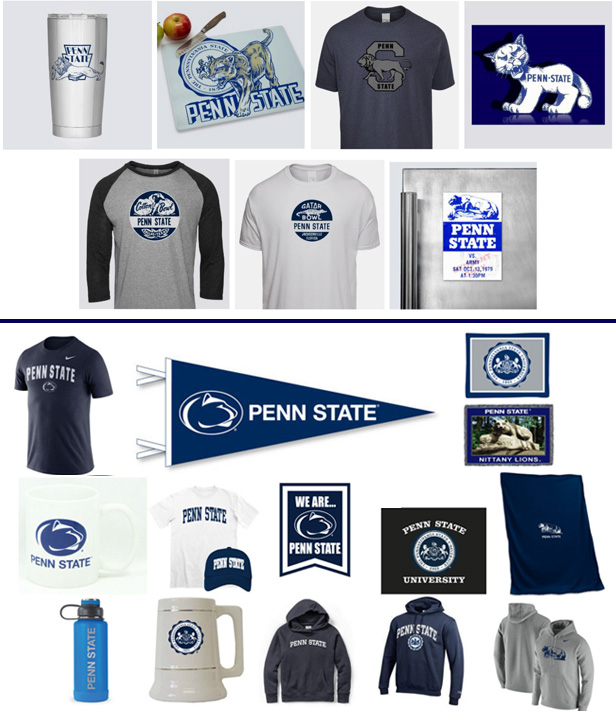November 20, 2024
Penn State Prevails in Trademark Trial Against Print-on-Demand Company
Vintage Brand said it was using historic images free for use in the public domain to decorate Penn State-themed products it sold, but a Pennsylvania jury thought differently.
Key Takeaways
• Verdict: A jury ruled Vintage Brand violated Penn State’s trademarks by selling unlicensed products that bore graphics that infringed on the university’s legally held marks.
• Damages: Penn State was awarded $28,000 in damages.
• Precedent Setter?: The case could set a precedent for other universities that are legally challenging Vintage Brand, though an appeal could be forthcoming.
A Keystone State jury has ruled that a Washington-headquartered print-on-demand company committed trademark infringement against The Pennsylvania State University in a high-profile trial that drew the attention of the licensed merchandise world and major universities around the United States.
While Vintage Brand claimed decorated apparel and other products it sold featured Penn State-themed designs that were historic and available in the public domain, a jury thought otherwise, determining that the printer had violated trademarks the university legally holds for its seal and other graphics, including several lion designs. Penn State’s sports teams’ moniker is the Nittany Lions.

Vintage Brand generated revenue of $23,219 by selling the offending products over the span of about three years – 2018 to 2021. The jury awarded Penn State $28,000 in damages.
The ruling was against Vintage Brand, its founder Chad Hartvigson and Sportswear, Inc., a Kentucky-based company that produces the graphic apparel and other products Vintage Brand sells. Hartvigson is reportedly a minority owner in Sportswear, Inc.
"Our trademarks are a direct and critical representation of the Penn State brand, and we are gratified by the jury's decision in our favor," Penn State said in a statement to ASI Media. "The university appreciates this result as it relates to the many hundreds of licensees with whom the university works and who go through the appropriate processes to use Penn State’s trademarks."
ASI Media also contacted Vintage Brand's attorneys for comment but hadn’t heard back as of this writing. It wasn’t clear if Vintage Brand would appeal, but in the run-up to the trial legal analysts opined that regardless of which way the case went appeals would be likely.

On the top are Penn State-themed products that Vintage Brand was selling. On the bottom are legally licensed Penn State-branded products. A jury found Vintage Brand was infringing on Penn State’s trademarks.
An Existential Threat?
The ruling could be an existential threat to Vintage Brand’s business model, providing a potential foundation upon which others could successfully sue the printer, though the case doesn't necessarily carry binding precedent. Approximately one dozen other lawsuits from U.S. universities are already reportedly in play, with similar claims of trademark infringement.
Vintage Brand takes what it has described as “historic artistic images” reproduced from “vintage memorabilia” and then prints the designs on apparel, drinkware, hats, can coolers and other products it sells directly to consumers. As with Penn State though, those designs clearly associate the merchandise with a wide range of American universities and professional sports teams, as can be seen on the Vintage Brand website.
As Penn State Attorney David Finkelson pointed out at trial, universities with big-time sports programs that generate ample merch sales were closely monitoring the case.
Had Vintage Brand prevailed on its arguments, legal analysts said trademark law as it’s known could have been upended and it would have become more difficult for trademark holders – whether sports teams, universities or any type of brand – to enforce what they believe to be their legal rights on their marks. That could have significantly impacted trademark holders that sell, or license to be sold, branded merchandise bearing their marks.
One element of proving trademark infringement is showing that a consumer is misled into believing the alleged perpetrator is actually associated with the valid mark holder. During the trial, the Vintage Brand camp made the case that it provides numerous disclaimers that it’s “not affiliated with, licensed or sponsored by any college, team or league,” meaning no reasonable person could be deceived that it’s associated with Penn State.
Furthermore, the company argued that all the designs it turned into product graphics came from before 1989 and were historic and free for public use – not Penn State marks at all.
Still, Penn State presented evidence that at least some consumers believed Vintage Brand was associated with the university, as well as testimony from Penn State license holders who said their businesses would be hurt if Vintage Brand were allowed to continue its practices. Ultimately, the Pennsylvania jury felt Vintage Brand was leveraging Penn State marks improperly. It was notable, too, that Sportswear, Inc., which was doing the fulfillment but not marketing the designs/taking orders from customers, was also found to have violated Penn State trademark's for its participation.
